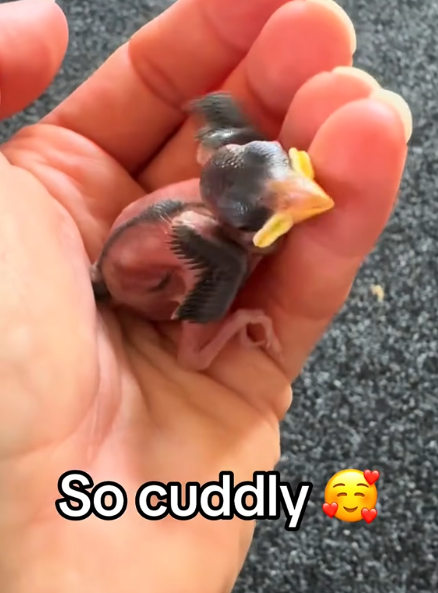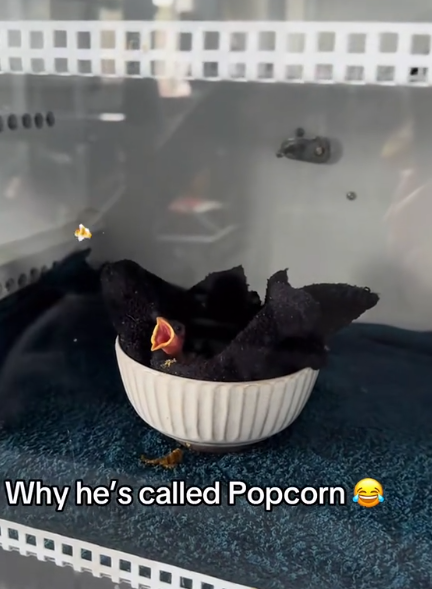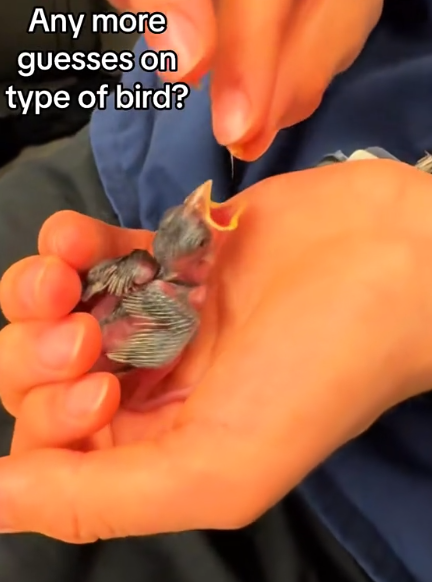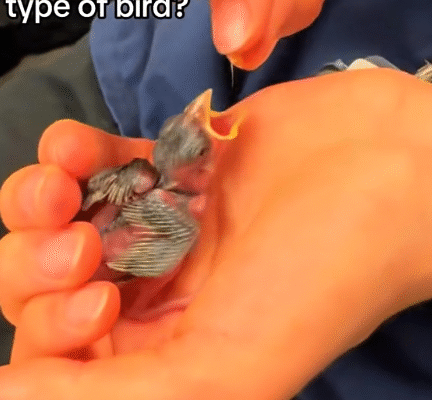
On a quiet Sunday morning, while taking his usual walk in the neighborhood park, Thomas noticed a tiny flutter near the base of a tall oak tree. At first, he thought it was just a leaf blowing in the wind, but as he got closer, he saw a small, helpless baby sparrow lying on the grass, chirping weakly. Its feathers were still patchy, its eyes barely open. Above, a broken nest dangled from a branch, clearly dislodged by the previous night’s storm.
Thomas looked around. No parent bird was in sight. No movement came from the tree above. It was clear the little creature had been abandoned — or perhaps its parents couldn’t reach it. Whatever the case, the baby bird wouldn’t survive much longer on its own.
Without hesitation, Thomas gently scooped up the sparrow using the bottom of his T-shirt, careful not to frighten or hurt it. He cupped the bird in his hands, feeling its tiny heartbeat racing with fear and confusion. He’d never raised a bird before, but he couldn’t just leave it there to die.
When he arrived home, Thomas got to work. He found a small cardboard box, lined it with soft tissue and cloth, and gently placed the baby sparrow inside. He named it “Sprig,” after the little sprig of green he noticed stuck in its downy feathers.
That first day was challenging. Thomas spent hours researching how to care for a baby bird. He learned that baby sparrows needed warmth, feeding every couple of hours, and lots of patience. He made a makeshift incubator using a heating pad under one side of the box and began feeding Sprig every 30 to 45 minutes with a special mixture made from wet cat food, egg yolk, and mashed mealworms, carefully administered using a small syringe.
Sprig was weak at first, but day by day, his strength returned. His chirps grew louder, his appetite stronger. His feathers slowly filled in, transforming from soft, sparse fuzz into sleek, brown wings. Every time Thomas entered the room, Sprig chirped and hopped toward the edge of the box, recognizing the man who had become his caretaker.
Soon, Sprig was strong enough to hop outside the box. Thomas created a play area in his living room with soft pillows and low perches. He began teaching Sprig how to fly. At first, Sprig struggled — falling short of the perch or bumping into nearby furniture. But Thomas never gave up. He clapped and encouraged the little bird every time he flapped his wings and tried.

After three weeks, Sprig flew confidently around the living room. He would perch on Thomas’s shoulder and chirp a greeting whenever he came home from work. The bond between man and bird had become incredibly strong — something neither of them expected.
But Thomas knew that Sprig belonged in the wild. No matter how much he loved him, Sprig was a wild bird by nature. He deserved to live freely, among the trees and sky. It was a difficult decision, but Thomas began preparing for the next step: releasing Sprig back into nature.
He started by taking Sprig outside in a cage so the bird could become accustomed to the sights, sounds, and smells of the outdoors. Sprig would sit and watch other birds flying, chirping in a curious rhythm that sounded like longing. Eventually, Thomas began opening the cage door during their outdoor time. Sprig hesitated at first but slowly grew bolder.
Then, one crisp morning, Sprig leapt from the cage, flew up into the air, and didn’t immediately come back down. He circled the yard, then landed on a nearby tree branch, chirping down at Thomas as if to say, “Look! I can do it!”
It was bittersweet. Sprig had learned to fly. He had grown strong and independent. That afternoon, he flew away into the trees and didn’t return.
Thomas stood there for a long time, hands in his pockets, watching the sky. Part of him felt proud, like a parent watching their child go off into the world. Another part of him felt the ache of loss — the absence of those joyful chirps every morning, the flutter of wings on his shoulder.

But fate had a surprise in store.
A few days later, Thomas heard a familiar chirp outside his window. He rushed out and saw Sprig on the branch of the same tree where he had first landed. But he wasn’t alone. Another small sparrow sat beside him.
Sprig hopped closer to Thomas, chirping enthusiastically, before flying down to perch on his arm. The second sparrow watched from above. It seemed Sprig had made a friend — or maybe even found a mate.
Over the following weeks, Sprig came back regularly. Sometimes with his new companion. Sometimes alone. He’d perch on the windowsill, accept a treat from Thomas’s hand, chirp a happy tune, and then fly off again. It became a ritual — a reminder of the special bond between human and animal, between rescue and release.
Thomas built a birdhouse in his yard, and Sprig started visiting it often. One day, he noticed nesting material inside. A few weeks later, he spotted two tiny heads peeking from the birdhouse — baby sparrows. Sprig had become a father.
Watching Sprig care for his own young brought everything full circle. The tiny helpless creature Thomas had once saved had grown up, returned to the wild, and started his own family — all while never forgetting the man who gave him a second chance.
Neighbors began to notice the sparrow that seemed unusually comfortable with humans. Some would ask Thomas about it, and he would tell them the story. Over time, his act of kindness became an inspiration to others — a reminder that even the smallest creatures deserve compassion.
For Thomas, the experience changed his life. He had always been kind, but now he felt deeply connected to the natural world in a way he hadn’t before. He started volunteering at a local wildlife rescue, helping other injured or orphaned birds. His home became a temporary haven for feathered friends in need.
And every time he heard a sparrow’s chirp outside his window, Thomas smiled — knowing that even a tiny act of kindness can ripple outward in the most beautiful and unexpected ways.
In the end, rescuing Sprig wasn’t just about saving a bird. It was about finding purpose, forging connection, and learning that love, no matter how small, always finds a way to soar.



